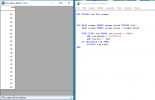Is it posible to get this work
FOR EACH table1,
EACH table 2 where table2.field1 = table1.field1.
FIND FIRST table2
IF table2 AVAILABLE THEN
UPDATE table2.field2 = somthing.
I know this procedure dont work because cant use FIND after FOR EACH.
I hope you guys understand what i want to achieve here, and if there any way to achieve this please help.
Thx for help.
FOR EACH table1,
EACH table 2 where table2.field1 = table1.field1.
FIND FIRST table2
IF table2 AVAILABLE THEN
UPDATE table2.field2 = somthing.
I know this procedure dont work because cant use FIND after FOR EACH.
I hope you guys understand what i want to achieve here, and if there any way to achieve this please help.
Thx for help.

